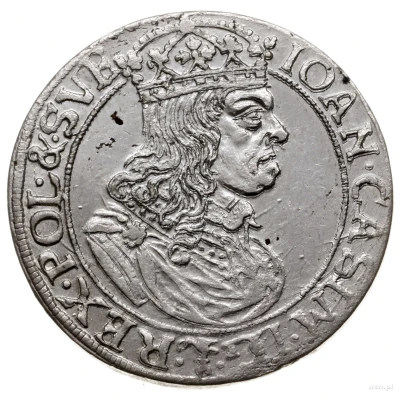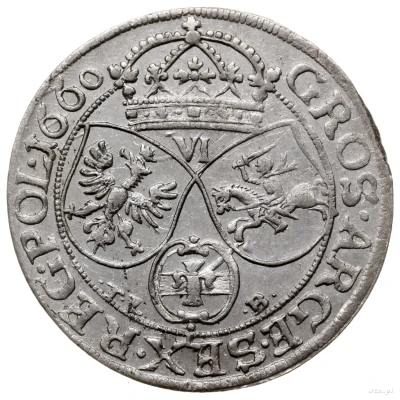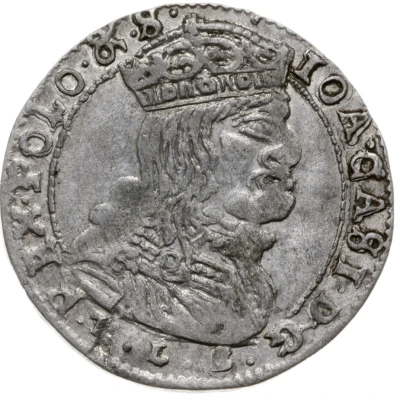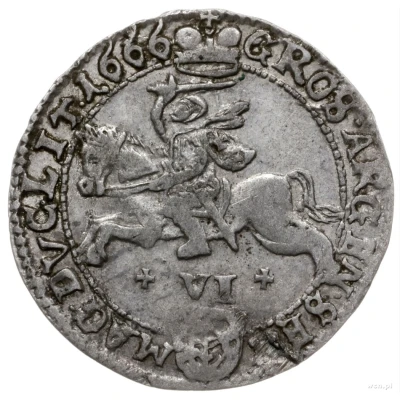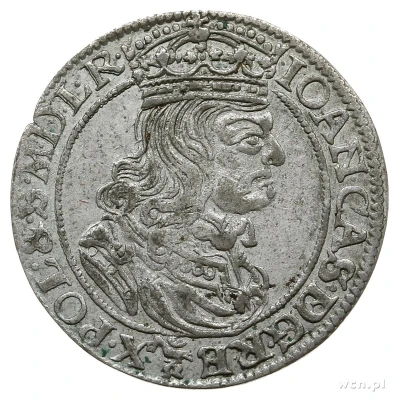
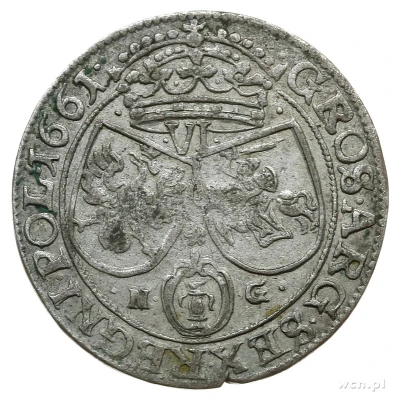

© Warszawskie Centrum Numizmatyczne s.j.
Szóstak / 6 Groszy - Jan II Kazimierz Waza Poznań
| Billon (.375 silver) | 3.7 g | 25 mm |
| Issuer | Polish–Lithuanian Commonwealth |
|---|---|
| King | John II Casimir Vasa (1649-1668) |
| Type | Standard circulation coin |
| Years | 1651-1662 |
| Value | 6 Groschens (Szóstak) (⅕) |
| Currency | First Zloty (1573-1795) |
| Composition | Billon (.375 silver) |
| Weight | 3.7 g |
| Diameter | 25 mm |
| Shape | Round |
| Demonetized | Yes |
| Updated | 2024-10-07 |
| Numista | N#168268 |
|---|---|
| Rarity index | 83% |
Reverse
Crown above three shields with Poland, Lithuania (top) and Vasa (bottom) arms. Value below crown, initials flanking bottom shield.
Script: Latin
Lettering:
GROS ARG SEX REGNI POL 1661
VI
N G
Unabridged legend: Grossi argenti sex Regni Poloniae 1661
Translation: Six silver groszy of the Kingdom of Poland 1661
Comment
Mint: Poznań - Poznan - Posnanie - Posen - Познань - 波茲南- The initials NG reverse are for Nicolaus Gilli, the mint tenant of Poznan 1660-1662. This mark is aways diagnostic of Poznan coins.
- The Slepowron (bird facing left atop horseshoe) is the arms of crown treasurer Johann Krasinski
Kopicki 1607 1651
Kopicki 1626 1661. No inner circle obverse or reverse. Simple shields and NG reverse
Pictures: © GNDM
Kopicki 1627 1661. Inner circles both sides. Simple shields and NG reverse.
Pictures: © WCN
Kopicki 1628 1661. No inner circle obverse or reverse. Shields with curved sides and NG reverse.
Kopicki 1646 1662 - No inner circles obverse or reverse. NG reverse.
© Warszawskie Centrum Nuizmatyczne
Kopicki 1647 1662. Inner circle obverse only. NG reverse.
© GNDM
Kopicki 1648 1662. Inner circle reverse only, with NG.
Kopicki 1649 1662. Inner circles both obverse and reverse. NG reverse.
Interesting fact
One interesting fact about the Standard circulation coin Szóstak / 6 Groszy - Jan II Kazimierz Waza (Poznań) 1651-1662 from Polish–Lithuanian Commonwealth is that it was minted during a time of great turmoil in the region. The Polish-Lithuanian Commonwealth was facing numerous challenges, including wars with neighboring countries and internal conflicts, which led to a shortage of currency and a need for new coins to be minted. This coin, made of Billon (.375 silver) and weighing 3.7 g, was one of the coins minted during this time to help address the currency shortage. Despite the challenges faced during its minting, the coin remains a valuable piece of history and a testament to the resilience of the Polish-Lithuanian Commonwealth.
